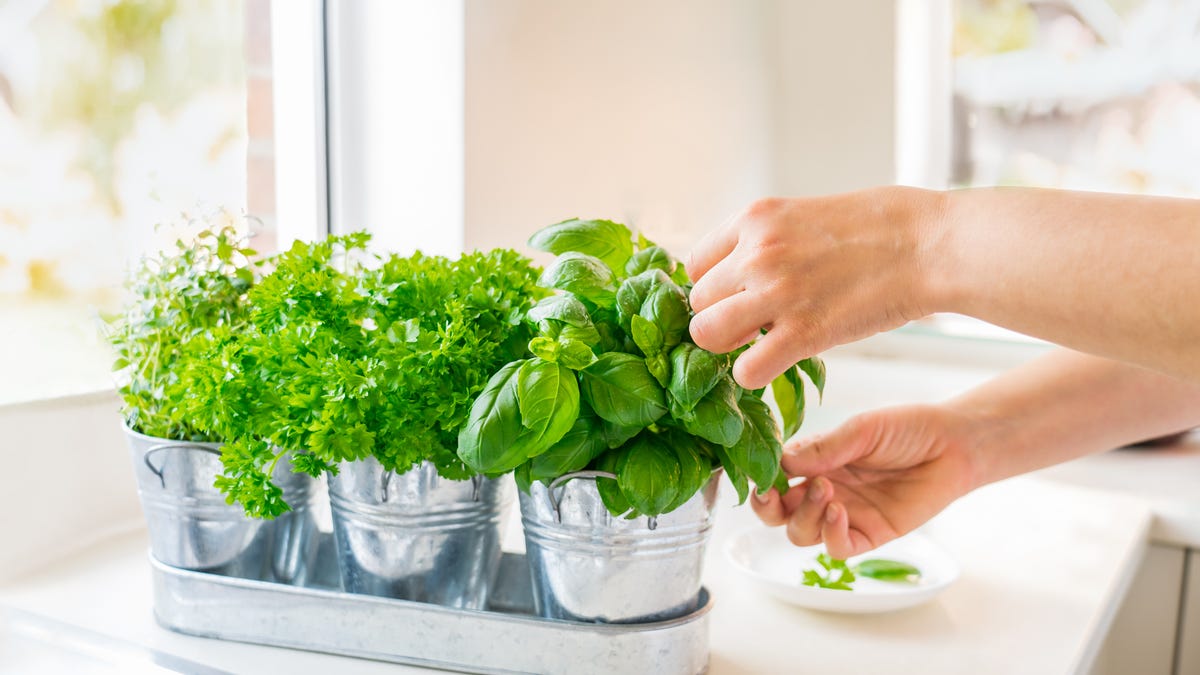Here's the Best Way to Grow Vegetables Without a Backyard
No backyard? No problem.

With a little bit of space, a few containers and the right plants, you'll have everything you need to create a home garden.
Living in an apartment has its benefits. I don't have to pay a mortgage or front so many maintenance expenses, and I love having easy access to both a gym and a pool. But there is one downfall: no backyard for gardening.
I long for a backyard where I can have sprawling planter beds with herbs and veggies, fruit trees and giant pots of flowers. Not only can you skip a trip to the grocery store by home-growing your food, but produce grown in a garden actually has more nutrients and gardening has several health benefits.
Luckily, I -- and my fellow renters -- don't have to put our gardening dreams entirely on hold. We just need container gardens.
With the help of a container garden, I can make use of what little outdoor space I have to grow my favorite fruits, vegetables and herbs. Whether you have a few feet of balcony space or a several inches on your counter, you can create a container garden, too.
And if you have the space, grow a better garden with our summer gardening guide.
How can I get started with container gardening?
Container gardening , simply put, is growing plants in containers or pots rather than in the ground. If your yard is nothing more than a concrete slab or you don't have one at all, container gardening helps you overcome that.
There are big advantages to container gardening: Containers require less water, you can move plants around to meet their sunlight needs, and you can control pests and avoid soil-borne issues such as fungus and bacteria. They are also flexible, allowing you to add plants and rearrange pots as you want.
Just a little bit of counter space is all you need to grow herbs.
What is your sunlight situation?
Before you buy plants, take stock of the lighting conditions you have. Does your balcony, patio or windowsill get several hours of sun everyday?
Most fruits and vegetables will need at least six hours of sunlight to produce. Leafy greens, root plants (like scallions or radishes) and herbs can get away with three to four hours.
What grows well in a container garden?
Now it's time to consider how much space you have for your container garden. Some plants require large pots and ample room to grow, while others can easily be confined to a countertop.
If you have a balcony, patio or other outdoor space
Here, you're only limited by how much room you have. Pick plants that grow well in your hardiness zone and you'll be rewarded with fresh fruits and vegetables.
Here's what grows best outdoors:
- Large and tall plants such as tomatoes, peppers, melons and squash
- Plants that spread, such as strawberries, beans and cucumbers
- Small fruit trees, including apple, lemon or avocado
With the right amount of space, you can grow fruit trees in a container garden.
If you only have indoor space or a few inches of countertop space
Even without any outdoor space, you can still successfully cultivate a home garden. Many plants do OK inside, provided they have access to the right amount of light.
These plants can thrive indoors:
- All manner of lettuce and leafy greens
- Root plants such as green onions, carrots and ginger
- Mushrooms
- Basil, cilantro, parsley, mint, chives and most any other herbs
More container gardening tips
If you need to move your plants around a lot to account for sun, use plastic pots. They hold onto moisture better than terracotta pots, are much lighter, and won't crack easily.
You can start your garden from seeds, but you'll find it's easier to buy already established plants. This is especially true for any kind of fruit tree, tomatoes, eggplant, peppers and basil.
Large plants, including tomatoes, cucumbers, and squash will need large pots they can grow into. Some vegetables, such as tomatoes and green beans, will need trellises or cages to help support them as they grow.
With a little bit of space, a few containers and the right plants, you'll have everything you need to create a mini farmer's market at home.

